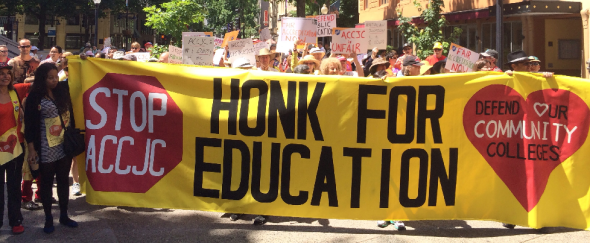By Tim Redmond
AUG. 6, 2014 — City College fairly quietly acceded to the latest bizarre demand of the Accrediting Commission for Junior and Community Colleges last week, agreeing to apply for “restoration status,” an entirely new creation of the commission.
But the terms of the application are onerous, and the conditions essentially impossible to meet – meaning that City College, almost by definition, is being set up to fail.
The ACCJC’s requirements for “restoration” of accreditation include 100 percent compliance with the panel’s recommendations and mandates – a standard that no school can reasonable meet. I’m sure Harvard University doesn’t get 100 percent on its accreditation reports; there’s always something that someone could do differently or better. (Harvard doesn’t post its accreditation reports, but UC Berkeley does. One of the premier public schools in the world faces challenges, and in the most recent report, the accreditors noted those and made suggestions for improvement. By the ACCJC’s “restoration” standards, UC Berkeley would lose its accreditation.)
The new process also requires City College to waive any rights of appeal – which means if the ACCJC decides to reject the application, there’s nothing more that the school can do except rely on the courts to intervene.
As Tim Killikelly, president of the City College teachers’ union, noted in a letter to Special Trustee Robert Argrella:
We fear that this is but another trap for CCSF designed to save the ACCJC not CCSF. Our college has already been betrayed by the original show cause sanction, then in the failure of the review process, and finally in the denial of our appeal.
Until a few months ago, there was no such thing as “restoration status.” The ACCJC cooked that up when it became clear that (a) nobody in the state, or in Washington, had much faith in the accreditors or their process, and (b) the federal Department of Education had informed the ACCJC that it could extend the deadline for City College to comply, and (c) City Attorney Dennis Herrera was moving forward with a lawsuit that could throw this entire bogus process out, leaving the ACCJC’s very existence at risk.
So instead of putting City College on probation, and giving the school (which, by the way, has already complied with 95 percent of the accreditors’ mandates) time to finish the job, or simply delaying the compliance deadline, the ACCJC crafted an entirely new process.
Help us save local journalism!
Every tax-deductible donation helps us grow to cover the issues that mean the most to our community. Become a 48 Hills Hero and support the only daily progressive news source in the Bay Area.
And the school had very little choice but to go along. This was the only offer on the table, the only way to demonstrate that City College is making every effort to follow the administrative rules. So when the courts finally intervene, nobody can argue that CCSF didn’t try.
But it’s not as if this is any kind of real reprieve.
“The process is fraught with the opportunity for people who operate in bad faith to continue to operate in bad faith,” City College trustee Rafael Mandelman told me.
The accreditors haven’t been out to City College since 2013, and are still working from a report done 16 months ago. “And now they give us eight months to fix everything,” John Rizzo, president of the board, told me.
“It’s more of the same,” Rizzo said. “We are officially ‘accredited pending revocation.’” And that, of course, hurts enrollment, which hurts class offerings (under-enrolled classes can be cancelled), which continues the downward spiral that the ACCJC started and seems to want to continue.
Kilikelly told me the new status “is completely unprecedented.” Unlike most schools, which win accreditation if they are “substantially in compliance,” City College will have to be perfect, an almost unattainable result for an institution that has served as many as 80,000 students.
“We could meet 99.9 percent of the standards and still lose accreditation,” Killikelly said.
In reality, I think the ACCJC is going to have to find a face-saving way to avoid that option, because killing City College would unleash a torrent of political anger that the commission would never survive. Already, the Democratic leadership in Congress and pretty much everyone in the state Legislature, Republican and Democrat, is ready to crack down on the rogue group. “They are so arrogant, they have no support up here, zero,” one state legislator told me.
And I’m not a lawyer, but the odds seem pretty good to me that Herrera’s lawsuit, slated to go to trial in late October, will produce such damning information that the ACCJC’s accreditation process will be rejected by the court.
At worst, that means a “do-over” – the ACCJC would have to go back and start again with a new, more balanced, review. At best, the credibility of the agency will be so badly damaged that the state and the feds will have to shut it down and replace it.
In the meantime, though, this farce continues – and the students at City College, along with the residents and businesses of San Francisco, are suffering from the impacts.





